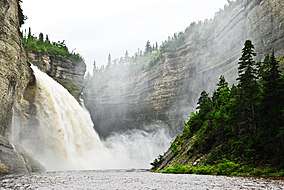Anticosti National Park
| Anticosti National Park | |
|---|---|
| Parc National d'Anticosti | |
 Vauréal waterfall | |
 | |
| Location | Quebec, Canada |
| Nearest city | Port-Menier, Quebec |
| Coordinates | 49°30′N 62°50′W / 49.500°N 62.833°WCoordinates: 49°30′N 62°50′W / 49.500°N 62.833°W |
| Area | 571.9 km2 (220.8 sq mi) |
| Established | April 2001 |
| Visitors | 5500 (in 2009) |
| Governing body | Sépaq |
| www | |
Anticosti National Park (French (official): Parc National d'Anticosti) is a provincial park of Quebec, Canada.[1] It consists of 3 non-contiguous areas totalling 572 square kilometres (221 sq mi) of land in the centre of Anticosti Island.
It is organized into 6 tourist sectors and 1 central zone:[2]
- Baie-de-la-Tour
- Chicotte
- Chute-Vauréal
- Grotte-à-la-Patate
- Observation
- Vauréal-la-Mer
- Zone centrale
History[]
The idea of creating a park on Anticosti Island goes far back. Already in the 1920s, the richness of Anticosti's flora was highlighted by botanist Marie-Victorin, who described the canyon of the Vauréal River as a "remarkable sanctuary" for ferns. But for the following decades, the entire island was privately owned by a succession of logging companies who invested little or nothing in environmental protection.[3][4]
In 1974, Anticosti Island was bought by the Government of Quebec and became public land once again. In 1987, the Regional County Municipality of Minganie officially incorporated the idea of creating a park in the Vauréal River area in its development plan. Thereafter, it took 14 years to complete the research, studies, planning, and public hearings. The Quebec government created the Anticosti National Park on April 26, 2001.[3]
Park features[]
Natural attractions:[2]
- Vauréal Canyon and Waterfall - At the Vauréal Waterfall, the Vauréal River drops 76 metres (249 ft) and then flows through a 90 metres (300 ft) deep gorge.
- Tour Bay (Bay de la Tour) - This bay on the north side of the island is noteworthy for its breathtaking seascape with huge cliffs surrounding the bay and excellent bird watching opportunities.
- Potato Cave (Grotte à la Patate) - This 625 metres (2,051 ft) cave is one of the longest caves in Quebec. It is named after the Potato River (Rivière à la Patate) which gets its name from a large granite erratic boulder shaped like a potato that is located at the river's mouth.
- Brick River Canyon
- Observation River Canyon
Activities:
- Hiking - 45 kilometres (28 mi) of trails of various difficulty
- Horseback riding
- Sea kayaking
- Guided tours
Park amenities:
- 2 Visitor centres with restaurant, gasoline, and equipment rental
- Accommodation in inns, cabins, or campgrounds
- Picnic areas
References[]
- ^ Registre des aires protégées du Québec Archived 2013-12-12 at the Wayback Machine, Ministère du Développement durable, de l'Environnement et des Parcs. (in French)
- ^ Jump up to: a b Parc national d'Anticosti - Park Journal 2008-2009 Edition, Parcs Québec
- ^ Jump up to: a b "Portrait du parc - Histoire de la création du parc national d'Anticosti" (in French). Sépaq. Retrieved 2009-11-10.
- ^ "Histoire d'Anticosti" (in French). Municipalité de L'Île-d'Anticosti. Archived from the original on 2010-05-05. Retrieved 2009-11-10.
| Wikimedia Commons has media related to Parc national d’Anticosti. |
- IUCN Category II
- National parks of Quebec
- Protected areas of Côte-Nord
- Anticosti Island
- Protected areas established in 2001
- 2001 establishments in Quebec
